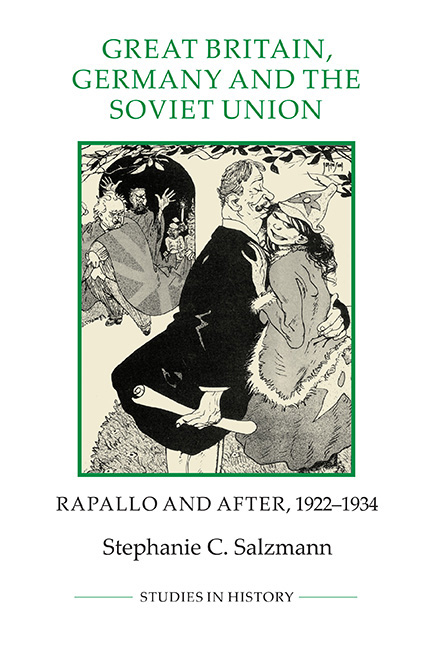Book contents
- Frontmatter
- Contents
- Acknowledgements
- Abbreviations
- Introduction
- 1 ‘It Nearly Overthrew the Applecart’: Lloyd George and the Treaty of Rapallo
- 2 ‘The Most Important Event Since the Armistice’: The Foreign Office and Rapallo
- 3 Rapallo's First Test: The Ruhr Crisis
- 4 The Policy of Conciliation: Rapallo and the First Labour Government
- 5 The Battle for the German Soul: Locarno and the Treaty of Berlin
- 6 Rapallo and the Rupture of Anglo-Soviet Relations
- 7 Rapallo and the Decline of the Locarno Spirit
- 8 An Economic Rapallo?
- 9 Rapallo and the Disarmament Conference
- 10 The Rapallo Relationship and Hitler's Rise to Power
- 11 The End of Rapallo: The German–Polish Non-Aggression Treaty
- Conclusion
- Bibliography
- Index
- Frontmatter
- Contents
- Acknowledgements
- Abbreviations
- Introduction
- 1 ‘It Nearly Overthrew the Applecart’: Lloyd George and the Treaty of Rapallo
- 2 ‘The Most Important Event Since the Armistice’: The Foreign Office and Rapallo
- 3 Rapallo's First Test: The Ruhr Crisis
- 4 The Policy of Conciliation: Rapallo and the First Labour Government
- 5 The Battle for the German Soul: Locarno and the Treaty of Berlin
- 6 Rapallo and the Rupture of Anglo-Soviet Relations
- 7 Rapallo and the Decline of the Locarno Spirit
- 8 An Economic Rapallo?
- 9 Rapallo and the Disarmament Conference
- 10 The Rapallo Relationship and Hitler's Rise to Power
- 11 The End of Rapallo: The German–Polish Non-Aggression Treaty
- Conclusion
- Bibliography
- Index
Summary
The treaty of Rapallo which Germany and the Soviet Russia signed on Easter Sunday 1922 during the Genoa conference, was the first serious challenge to the post-Versailles political system. Despite repeated German–Soviet denials, other states at once suspected second thoughts behind the agreement. From the outset, this caused the treaty to become a byword for potentially dangerous secret co-operation between the two revisionist European pariahs after the First World War. The burning question was whether – and to what degree – it would shatter the fragile new Europe and influence the policies of individual countries. A ‘myth’ of Rapallo had emerged.
The German–Soviet coup de surprise briefly disturbed the evolutionary process of re-establishing a stable European order after the great war, but never caused it lasting damage. Above all Rapallo challenged Britain and France, who had emerged as the leading powers in Europe's post-war political system. Neither country had yet recovered from the four years of war. Peace, stability and a gradual reintegration of the vanquished powers into European affairs, on terms which they would define, were therefore at the top of both countries’ foreign policy agenda. The war had left France traumatised by Germany's strength and suffering from a severe inferiority complex. The goal driving French negotiations at the Paris peace conference had therefore been to weaken Germany as far as possible and limit her scope for political, economic and military recovery. Britain, by contrast, believed in the necessity of maintaining a certain balance of power on the continent. With the dissolution of tsarist Russia and its replacement by a communist authoritarian regime, as well as the disappearance of Austria–Hungary and the emergence of a number of small successor states trying to find their own position in the international system, Germany was needed to counterbalance France, the only remaining continental great power, to some extent. Britain therefore had an interest in preventing France from imposing excessively crushing peace terms on Germany but refused to give Paris any far-reaching security guarantees against the Teutonic neighbour. Consequently, the French demanded additional security guarantees before they would even consider agreeing to any modifications of the Versailles treaty in Germany's favour. Britain, however, was neither willing nor in a position to grant France the desired guarantees. Being an imperial power with worldwide responsibilities, Britain had stretched her capabilities to the limit and could not assume further assignments.
- Type
- Chapter
- Information
- Great Britain, Germany and the Soviet UnionRapallo and after, 1922-1934, pp. 170 - 180Publisher: Boydell & BrewerPrint publication year: 2002



